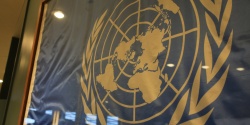Published: 20.09.2022

· The high-level debate of the United Nations General Assembly, the annual meeting of heads of state and government, will begin in New York.
· This meeting is an opportunity for Polish representatives to confirm internationally that there is no right to abortion.
· This position would be important in view of the UN resolution on access to justice for victims of sexual violence adopted in early September.
· This act seeks to rank abortion as one of the human rights.
· Poland's declaration of objection to this type of content in the General Assembly would free Poland from the possible effects of resolutions, which would include, first and foremost, the creation of a customary law norm in the field of the right to abortion.
· The Ordo Iuris Institute asked Polish representatives at the General Assembly to express Poland's position on abortion by confirming and defending Polish legislation that protects life in a high-level general debate of the United Nations.
On September 2, the UN General Assembly approved the resolution "International Cooperation on Access to Justice, Remedies and Assistance for Survivors of Sexual Violence" by consensus. It called on states to ensure the promotion and protection of "sexual and reproductive" rights and "safe abortion". The resolution tries to position abortion as a human right, even though there is no international consensus on the matter or international binding document that would recognize it as a right.
Approval of the resolution in this manner means that it was adopted without a formal vote, thanks to the consensus mechanism, which is understood as no state objections to the content of the document. Although the resolution is not binding, it contributes to the creation of internationally valid customary law. Only when the state consistently opposes the creation of a customary norm, repeatedly protesting that it does not want to grant it a binding force (the so-called persistent objector), is a state unbound by this norm.
During the adoption of the resolution, Poland was not only one of its drafters, but during the debate in the General Assembly, it did not vote for the amendments proposed by Nigeria. They concerned the removal of controversial language about abortion and reproductive rights. Indeed, by not opposing the content of the resolution, Poland contributed to building a consensus on the resolution and attempts to create common law norms regarding the right to abortion.
The Ordo Iuris Institute called on the President of the Republic of Poland and the Minister of Foreign Affairs of the Republic of Poland to present Poland's position on abortion during the debate, denying the existence of the “right to abortion” and pointing out that the United Nations and the United Nations Agencies by promoting the so-called The "right to abortion" operates ultra vires (outside the scope of competence) as such a right has not been recognized in any binding document. Expressing a clear position in this respect will be important in the sphere of international law and will allow Poland to pursue its own policy in the field of protection of life from conception, both domestically and internationally.

17.04.2025
• The Ordo Iuris Institute has prepared an opinion for the UN as part of a thematic report on surrogacy and its impact on the rights of women and children.

• Representatives of Ordo Iuris took part in the second round of consultations ahead of the 58th Session of the UN Commission on Population and Development (CPD58) on global health policy.

The Court of Appeals in Lublin, Poland, has upheld the verdict of the Regional Court in Radom, sentencing a gynecologist to one year of imprisonment, suspended for three years. The doctor must also pay PLN 6,000 to the State Treasury in legal costs.

The Ordo Iuris Institute has prepared a guide for hospitals and doctors on how to respond to the Guidelines issued by the Minister of Health and the Attorney General regarding the performance of abortions. According to these Guidelines, the health premise that permits abortion can encompass any aspect of health—both physical and mental—including any health ailment.